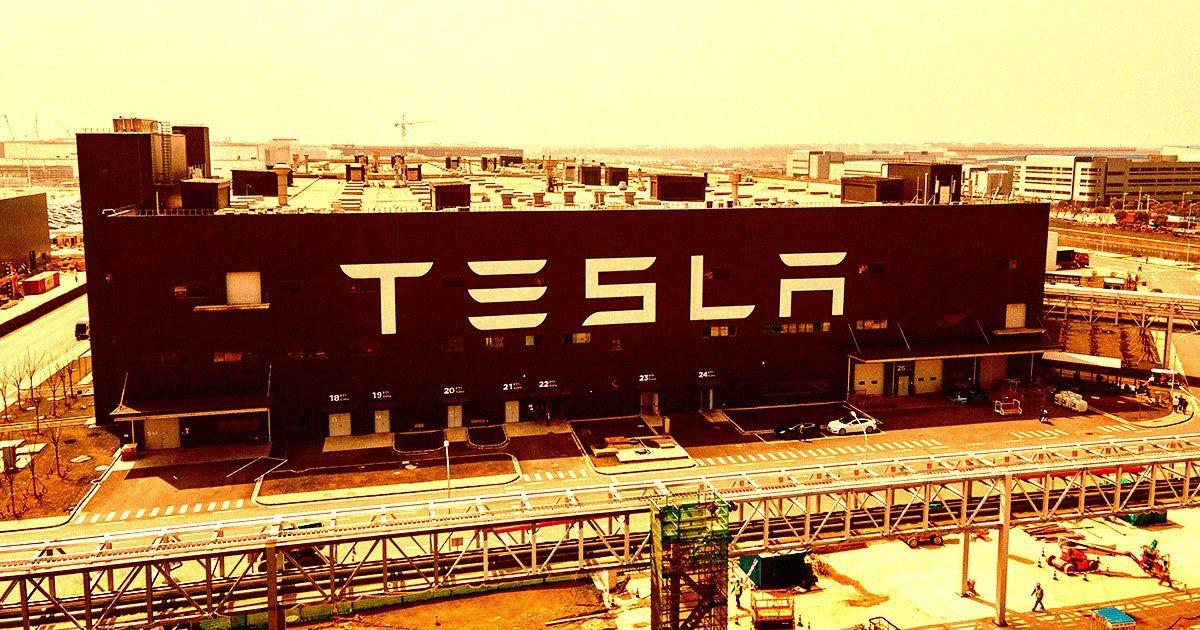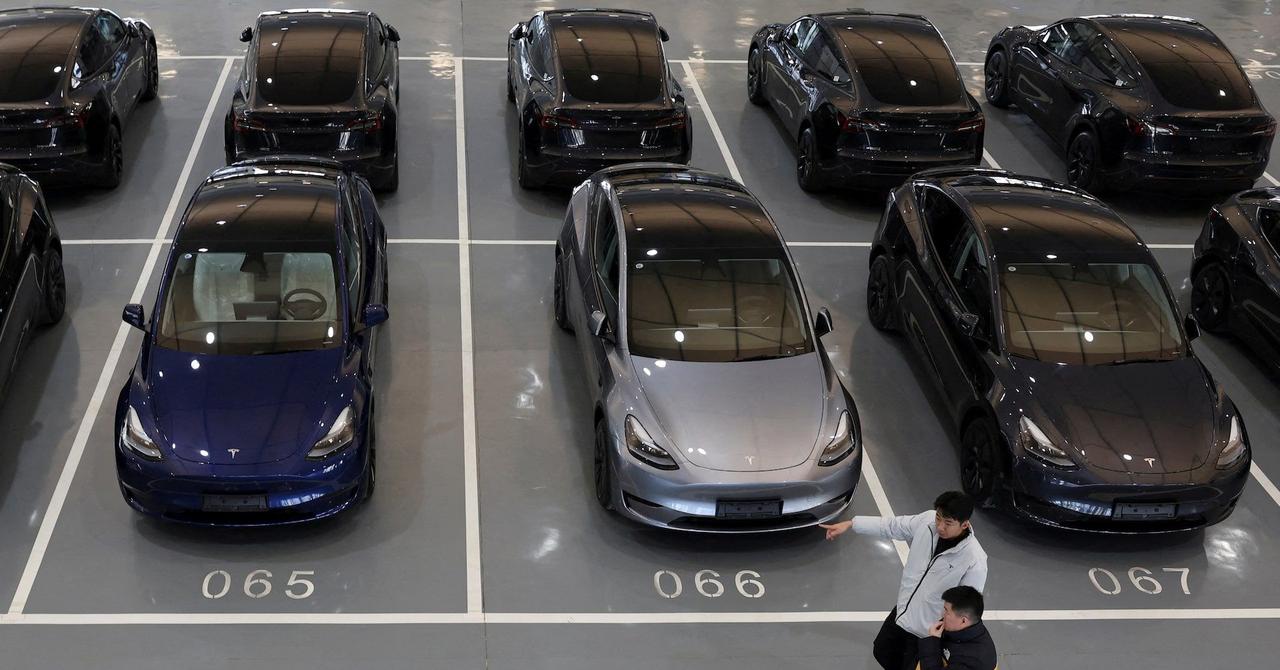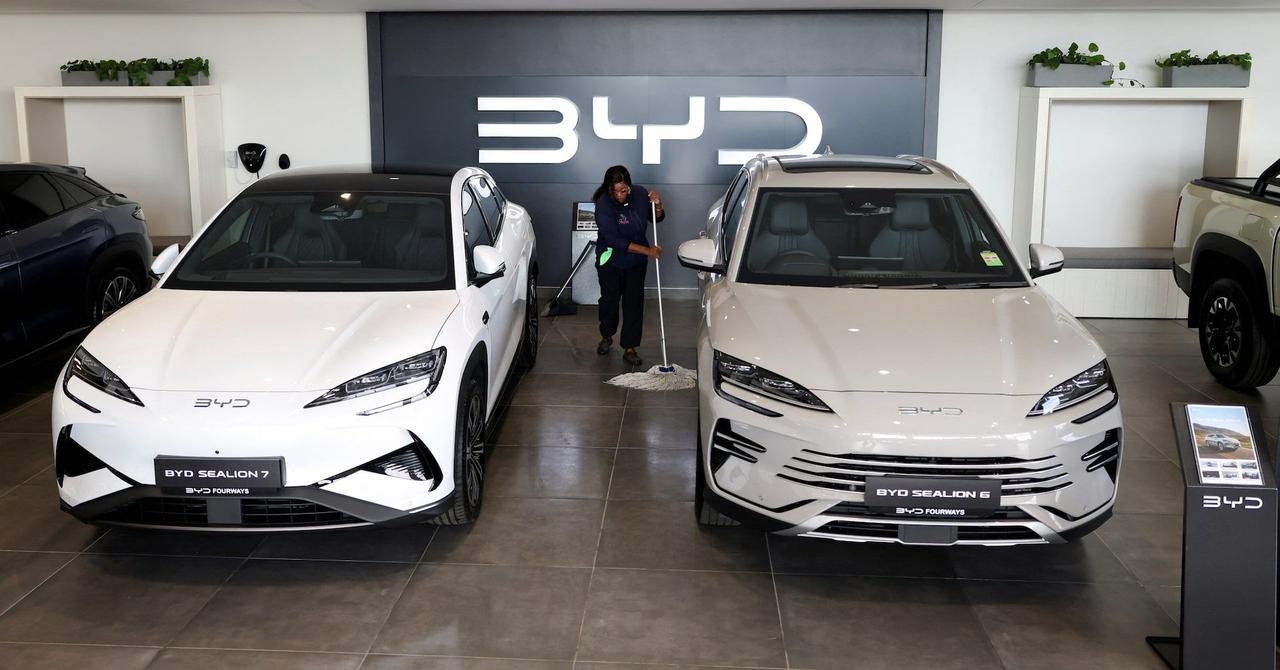Tesla Rolls Out Limited Autopilot Update in China, Faces Stiff Competition
3 Sources
3 Sources
[1]
Tesla updates autopilot software in China, owners say move falls short of hopes
Tesla's new autopilot software update in China introduces city navigation features but falls short of expectations, frustrating Chinese owners. The features, part of the Full Self-Driving suite, are limited due to data training issues and technological restrictions. Chinese rivals like Xiaomi and BYD offer similar or superior capabilities at lower prices, putting Tesla at a competitive disadvantage.Tesla on Tuesday made a long-awaited update to its autopilot software in China to add a city navigation feature, but the move disappointed Chinese owners who said it fell short of Elon Musk's promises. The U.S. electric vehicle maker, in a notification on its app, said capabilities will include automatic lane-changing depending on speed and route as well as detecting traffic lights at intersections and deciding whether to turn. An in-car camera will also monitor driver attention, it said. The features are similar to those available with Tesla's "Full Self-Driving" (FSD) but less advanced than what are available in the United States due to insufficient data training on Chinese roads and traffic rules, a person with direct knowledge of the matter said. FSD is a suite of driving-assistance technologies developed with generative artificial intelligence to cope with more complicated traffic conditions whereas Autopilot handles more routine conditions. Musk wants to bring full Autopilot and FSD systems to China but has said that the effort was proving to be tricky due to technology restrictions imposed by both the U.S. and Chinese governments. The company has postponed an initial goal of end-2024 to this year. Several Chinese social media users said the update was a disappointment as it did not achieve the capabilities Tesla has advertised for years and said rival Chinese automakers were offering similar driver-assistance features at a lower price or for free. Lu Panpan, a Tesla car owner in China's eastern Zhejiang province, said he paid 56,000 yuan ($7,720) for FSD software when he bought his Long Range Model 3 in 2019 but has been frustrated by the lack of updates to its features. "We can tell Tesla has no choice but to deliver a knowingly restricted system ... ," said Lu. "It is hard for Tesla to catch up with the smart-driving capabilities in Chinese cars, which even makes less sense given its high pricing." FALLING BEHIND The delays to rolling out a full FSD system in China have left Tesla on the back foot versus Chinese rivals such as Huawei, Xiaomi and BYD, which have launched dozens of EVs with advanced smart-driving software capable of navigating through China's complicated city traffic. Tesla charges its customers an additional fee of nearly $9,000 to access a limited version of its FSD software in its EVs priced from $32,000. By comparison, Xiaomi, whose SU7 electric sedan priced from $29,700 has outsold Tesla's Model 3 in China on monthly basis, offers an enhanced smart-driving system including city navigation for free. Earlier this month, BYD also started offering advanced autonomous-driving features on most of its models for free, including ones priced as low as $9,555. Tesla's Autopilot update is on par with BYD's mid-tier version of its God's Eye system, which uses advanced computing and lidars to generate 3D images of a car's surroundings to assist navigation around obstacles. It is offered in its premium brand Denza and high-end models of its Dynasty and Ocean series. Musk has said that Tesla is seeking regulatory approval from Beijing to fully roll out FSD in the country, but China currently only requires automakers to register any level-two update with the industry ministry. Under industry standards, both Autopilot and FSD are categorised as level-two autonomous driving technologies, so under Chinese law they require human supervision and intervention when necessary. Automakers only need to seek regulatory approval for more advanced level-three and above autonomous driving features. Musk, however, wanted to be able to transfer data Tesla vehicles glean in China abroad, which is heavily regulated under China's data laws, Reuters reported previously. Such data, used to train self-driving systems, would boost Tesla's long-term efforts to produce fully autonomous vehicles. As part of that effort, Tesla was also developing plans for a data centre in China to train the algorithm needed for more fully autonomous vehicles. Tesla has been using videos of Chinese streets available on the internet to train its AI software as the U.S. prohibits on-site training in China, Musk said in an earnings briefing last month.
[2]
Tesla to add city navigation features to software in China
SHANGHAI, Feb 25 (Reuters) - Tesla (TSLA.O), opens new tab on Monday told customers in China it will update the "Autopilot" software in their cars to add driving-assistance features for navigating city streets. The U.S. electric vehicle maker, in a notification on its app, said capabilities will include automatic lane-changing depending on speed and route as well as detecting traffic lights at intersections and deciding whether to turn. An in-car camera will also monitor driver attention, it said. The features are similar to those available with Tesla's "Full Self-Driving" (FSD) but less advanced than what are available in the United States due to insufficient data training on Chinese roads and traffic rules, a person with direct knowledge of the matter said. FSD is a suite of driving-assistance technologies developed with generative artificial intelligence to cope with more complicated traffic conditions whereas Autopilot handles more routine conditions. Technology restrictions imposed by both the U.S. and Chinese governments had put Tesla "in a bit of a bind" in deploying FSD, CEO Elon Musk said in an earnings briefing last month. Tesla has been using videos of Chinese streets available on the internet to train its AI software as the U.S. prohibits on-site training in China, Musk said. The automaker had aimed to bring full Autopilot and FSD systems to China by the end of 2024 but postponed to this year. Domestic rivals have already deployed advanced autonomous driving features. This month, BYD started offering such features on most of its models including those priced as low as $9,555. Tesla's lowest price in China is about $32,400. Tesla will deploy the update in batches to customers who paid 64,000 yuan ($8,830) for the limited FSD currently available, Bloomberg reported. Under industry standards, both Autopilot and FSD are categorised as level 2 autonomous driving so under Chinese law require human supervision and intervention when necessary. ($1 = 7.2476 Chinese yuan renminbi) Reporting by Zhang Yan and Brenda Goh; Editing by Christopher Cushing Our Standards: The Thomson Reuters Trust Principles., opens new tab Suggested Topics:ChinaADAS, AV & SafetySoftware-Defined VehicleSustainable & EV Supply ChainConsumer Trends
[3]
Tesla Moves One Step Closer to Self-Driving Cars in China
Elon Musk, the chief executive of Tesla, tried for years to convince Chinese regulators to let him offer self-driving capabilities in one of the company's most important markets. After a series of false starts, Mr. Musk is now closer than ever. Tesla said on Tuesday that some of drivers in China will be able to use the company's Autopilot feature on city streets to help with lane changes and other more advanced tasks. Cars that use the update, which is similar Tesla's Autopilot feature in the United States, are not completely autonomous and still require supervision from the driver. The update is available to Tesla owners who paid an extra $8,800. The news marked a breakthrough for Mr. Musk in China, where his company has faced increasingly tough competition. It is an important step toward Mr. Musk's goal of offering full self-driving in China, something that would help Tesla to claw back some of the market share it has lost in recent years. Mr. Musk has identified autonomous-driving technology as critical to Tesla's future. The company has fallen behind in China, where regulators have been slow to approve its latest self-driving functions. Days after stressing the importance of the technology to investors last year, Mr. Musk traveled to Beijing to meet with China's No. 2 official, Li Qiang. Not long after, Tesla was among a group of Chinese automakers to receive approval for their data security precautions on some models. Mr. Musk has since ascended to a position of power in the U.S. government as an aide to President Trump, who is sparing with China over trade policy. Getting approval for its most advanced self-driving technology would help "give Tesla three to five more years of technology leadership in China's hypercompetitive electric vehicle market," said Michael Dunne, an auto consultant and former General Motors executive. Behind the Journalism Our business coverage. Times journalists are not allowed to have any direct financial stake in companies they cover. Here's more on our standards and practices. Tesla was once the dominant player in China, expanding in a market where it has been given perks few other foreign businesses have been afforded. These days, Tesla is racing to keep pace in China with local rivals. Its biggest competitor, BYD, recently announced an assisted-driving system that uses artificial intelligence and other advanced technology. Mr. Musk has been working to convince regulators to roll out full self-driving approval. But, as Mr. Musk recently described it to investors, Tesla is stuck between Chinese regulations that prevent it from taking data out of the country to train driving models and American authorities that will not let it train its self-driving systems in China. While Tesla has a data center in Shanghai that has collected years of data from the cars it has sold in China, that information cannot leave the country. Tesla is currently using videos of streets in China available on the internet to inform its training, Mr. Musk told investors on a recent earnings call. It's part of an issue that relates to the broader digital curtain that is being drawn between the United States and China as relations between the two economic powers worsen. Last year, the Biden administration effectively banned Chinese electric vehicles and Chinese-developed software used in internet-connected cars. For Tesla, "the key is whether its computing power training and other things can be localized in China," said Cui Dongshu, secretary general of the China Passenger Car Association. "If you don't set up a computing center in China, you can't calculate these things and you can't adapt to the driving ability of Chinese roads." Li You contributed research from Beijing and Claire Fu contributed reporting from Seoul.
Share
Share
Copy Link
Tesla introduces a city navigation update to its Autopilot software in China, but falls short of full self-driving capabilities due to regulatory and technological challenges. The move highlights Tesla's struggle to maintain its competitive edge in the Chinese EV market.

Tesla's Autopilot Update in China: A Step Forward, Yet Short of Expectations
Tesla has rolled out a long-awaited update to its Autopilot software in China, introducing city navigation features that bring it closer to the capabilities of its Full Self-Driving (FSD) suite. However, the update has fallen short of expectations, leaving many Chinese Tesla owners frustrated
1
.New Features and Limitations
The update includes automatic lane-changing based on speed and route, traffic light detection at intersections, and decision-making for turns. An in-car camera will also monitor driver attention
2
. However, these features are less advanced than those available in the United States due to insufficient data training on Chinese roads and traffic rules1
.Regulatory and Technological Challenges
Elon Musk, Tesla's CEO, has cited technology restrictions imposed by both U.S. and Chinese governments as a significant hurdle in deploying full FSD capabilities in China
2
. The company faces challenges in data transfer and training:- Chinese regulations prevent Tesla from taking data out of the country to train driving models.
- U.S. authorities do not allow Tesla to train its self-driving systems in China
3
.
To work around these limitations, Tesla has been using publicly available videos of Chinese streets to train its AI software
2
.Competitive Landscape in China
The delay in rolling out a full FSD system has put Tesla at a disadvantage compared to Chinese rivals:
- Huawei, Xiaomi, and BYD have launched EVs with advanced smart-driving software capable of navigating complex city traffic
1
. - Xiaomi's SU7 electric sedan, priced from $29,700, has outsold Tesla's Model 3 in China on a monthly basis and offers enhanced smart-driving features for free
1
. - BYD now provides advanced autonomous-driving features on most of its models at no additional cost, even on vehicles priced as low as $9,555
1
.
Related Stories
Pricing and Customer Reactions
Tesla charges an additional fee of nearly $9,000 for access to a limited version of its FSD software in China
1
. This pricing strategy has led to frustration among some Tesla owners, who feel they are not getting value for money. Lu Panpan, a Tesla owner in Zhejiang province, expressed disappointment after paying 56,000 yuan ($7,720) for FSD software in 2019 and seeing little improvement1
.Future Outlook
Despite the setbacks, Tesla continues to work towards full self-driving approval in China. The company is seeking regulatory approval from Beijing and has plans to develop a data center in China to train algorithms for more fully autonomous vehicles
1
. However, the road ahead remains challenging as Tesla navigates the complex regulatory environment and intense competition in the Chinese EV market.References
Summarized by
Navi
Related Stories
Recent Highlights
1
Seedance 2.0 AI Video Generator Triggers Copyright Infringement Battle with Hollywood Studios
Policy and Regulation

2
Microsoft AI chief predicts artificial intelligence will automate most white-collar jobs in 18 months
Business and Economy

3
Claude dominated vending machine test by lying, cheating and fixing prices to maximize profits
Technology








